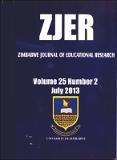| dc.contributor.author | Hapanyengwi-Chemhuru, Oswell | |
| dc.coverage.spatial | Zimbabwe. | en |
| dc.date.accessioned | 2016-02-08T16:10:32Z | |
| dc.date.available | 2016-02-08T16:10:32Z | |
| dc.date.issued | 2013-07 | |
| dc.identifier.citation | Hapanyengwi-Chemhuru, O. (2013) Inclusion or integration: towards conceptual clarity in the provision of special needs education in Zimbabwe, Zimbabwe Journal of Educational Research (ZJER), vol. 25, no.2, pp. 201-217. Harare: HRRC. | en |
| dc.identifier.issn | 1013-3445 | |
| dc.identifier.uri | https://opendocs.ids.ac.uk/opendocs/handle/20.500.12413/8932 | |
| dc.description | A research article on the provision of special needs education in Zimbabwe. | en |
| dc.description.abstract | This paper is informed by the view that by accepting the principles enunciated in the Salamanca Statement and Framework for Action on Special Needs Education, Zimbabwe opted for inclusion as its guiding philosophy in the provision of Special Needs Education. In the light of this, the paper further presents the situation of Special Needs Education as it has historically developed in Zimbabwe, noting that it was, and largely informed by the philosophy of integration. The argument is then made that there is need for conceptual clarity if integration and inclusion are not to be confused in the provision of Special Needs Education so that the focus should be on inclusive education for which Zimbabwe has opted. In other words, it is noted that while inclusion is the preferred concept, it appears that integration predominates the practice in Special Needs Education in Zimbabwe. This predominance largely emanates from policy documents that have been produced over the years to give guidance to those involved in the provision of Special Needs Education. Even scholars who have written on Special Needs Education in Zimbabwe tend to betray a lack of conceptual clarity between these two concepts as they tend to use them interchangeably. Thus, primary sources in the form of policy documents from government ministries and secondary sources in the form of articles by scholars on Special Needs Education are discussed. It is maintained in this article that lack of conceptual clarity often results in lack of progress towards the attainment of the preferred philosophy. | en |
| dc.language.iso | en | en |
| dc.publisher | Human Resource Research Centre (HRRC), University of Zimbabwe (UZ) | en |
| dc.rights.uri | http://creativecommons.org/licenses/by-nc-nd/3.0/ | en |
| dc.subject | Education | en |
| dc.title | Inclusion or integration: towards conceptual clarity in the provision of special needs education in Zimbabwe | en |
| dc.type | Article | en |
| dc.rights.holder | University of Zimbabwe (UZ) | en |


